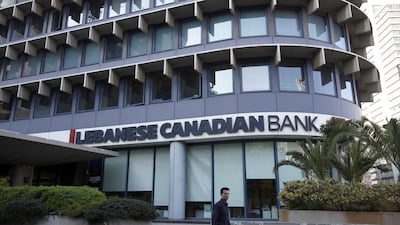A jurisdiction row has broken out between a top regional partner of Deloitte & Touche and an investor group that is suing him following the collapse of Lebanese Canadian Bank.
Deloitte & Touche (ME) and partner Joseph El Fadl are being sued by a group of shareholders of the Lebanese Canadian Bank, which went bust after being linked to an international drug smuggling and money laundering racket that had ties to Hizbollah.
A group of 11 shareholders that includes Qatar’s Sheikh Nasser bin Ali bin Saud Al Thani and Ghazi Abu Nahl, the Palestinian businessman, launched proceedings at the Dubai International Financial Centre Courts last year.
The shareholders allege that both Mr El Fadl and his employer acted negligently during their audit of the bank and failed to identify grounds for concern under anti-money laundering laws.
It is part of a wider web of legal action.
They claim the defendants in the case ignored matters that should have reasonably aroused suspicion in a complaint that runs to more than 100 pages.
Now Mr El Fadl, who leads Deloitte’s global financial services group in the Middle East, has challenged the jurisdiction of the DIFC Courts to hear the case.
The shareholder group that is suing him have been given until February 20 to offer arguments and evidence on why the case should be heard there, according to a DIFC Courts filing.
The litigation stems from a huge US government investigation into the Beirut-based bank which found that it was at the centre of a drug trafficking and money laundering network that moved narcotics from South America to Europe and the Middle East through West Africa, with the proceeds laundered through Lebanon’s financial system.
The investigation led the US authorities to issue a so-called FinCen notice on the bank as a “financial institution of primary money laundering concern”. Such notices, issued under the US Patriot Act, are known as death sentences for banks because they prevent them from accessing the US financial system.
By February 2011, the Lebanese Canadian Bank was forced to halt operations.
By the end of that year, the US government had successfully applied for the forfeiture of some US$102 million in assets controlled by the bank.
The FinCen notice issued by the US authorities also linked some managers at Lebanese Canadian Bank to Hizbollah officials – including the group’s Tehran-based envoy Abdallah Safieddine.
It found that nearly $230m of illicit funds had passed through the bank while Deloitte & Touche (ME) was its auditor.
The bank’s shareholders, who launched the legal action together, paid about $58m for a 24 per cent stake in the lender through a series of transactions in 2006 and 2007.
They claim that their losses arising from the collapse of the bank total some $128m.
The shareholder claimants in the case say that Deloitte & Touche (ME) is registered at the DIFC and that Mr El Fadl is subject to the supervision of the Dubai Financial Services Authority (DFSA) – and so both the firm and individual are subject to the jurisdiction of the DIFC Courts.
But Mr El Fadl challenges that jurisdiction.
Deloitte & Touche (ME) declined to answer questions relating to the claim, citing confidentiality obligations to the bank and its regulator.
In a statement it said it was confident that its “professional services to clients are of the highest standards of quality, integrity and professionalism, and are always in accordance with Deloitte’s professional standards as well as international standards and in line with the prevailing and relevant regulatory requirements”.
Mr Fadl did not immediately respond to emailed questions.
scronin@thenational.ae
Follow The National's Business section on Twitter

